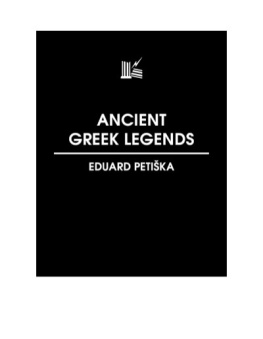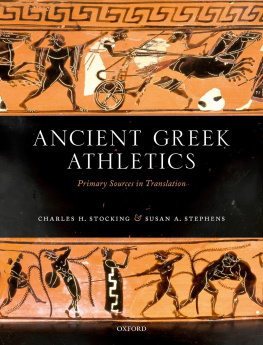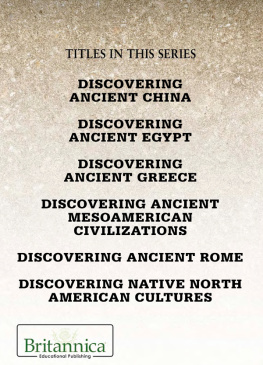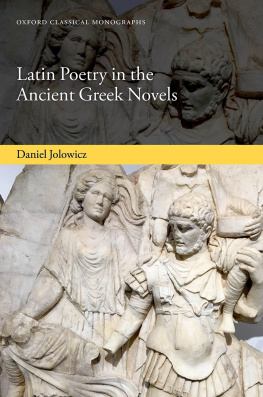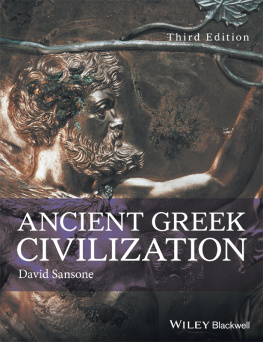Eduard Petiška - Ancient Greek Legends
Here you can read online Eduard Petiška - Ancient Greek Legends full text of the book (entire story) in english for free. Download pdf and epub, get meaning, cover and reviews about this ebook. year: 2013, genre: Art. Description of the work, (preface) as well as reviews are available. Best literature library LitArk.com created for fans of good reading and offers a wide selection of genres:
Romance novel
Science fiction
Adventure
Detective
Science
History
Home and family
Prose
Art
Politics
Computer
Non-fiction
Religion
Business
Children
Humor
Choose a favorite category and find really read worthwhile books. Enjoy immersion in the world of imagination, feel the emotions of the characters or learn something new for yourself, make an fascinating discovery.
- Book:Ancient Greek Legends
- Author:
- Genre:
- Year:2013
- Rating:3 / 5
- Favourites:Add to favourites
- Your mark:
- 60
- 1
- 2
- 3
- 4
- 5
Ancient Greek Legends: summary, description and annotation
We offer to read an annotation, description, summary or preface (depends on what the author of the book "Ancient Greek Legends" wrote himself). If you haven't found the necessary information about the book — write in the comments, we will try to find it.
Ancient Greek Legends — read online for free the complete book (whole text) full work
Below is the text of the book, divided by pages. System saving the place of the last page read, allows you to conveniently read the book "Ancient Greek Legends" online for free, without having to search again every time where you left off. Put a bookmark, and you can go to the page where you finished reading at any time.
Font size:
Interval:
Bookmark:
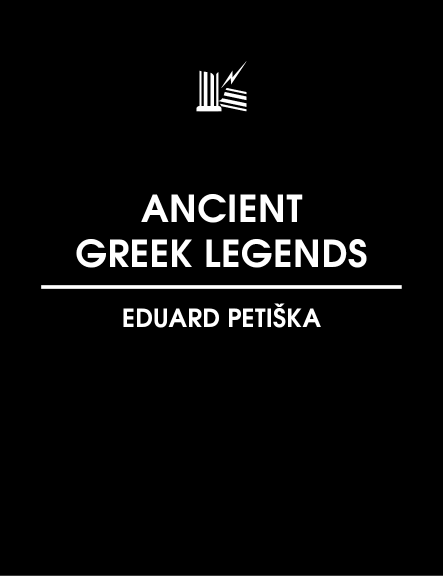

Ancient Greek legends
Published by the Publishing house Education s.r.o.
education@petiska.cz
Copyright (c) Eduard Petika 2013
Copyright oblka (c) Jakub Mare 2013
Translated by Norah Hronkov
Second electronic edition.
ISBN
978-80-87781-75-3 - epub
978-80-87781-76-0 - pdf
978-80-87781-77-7 - mobi
probably the most famous of Petika's works, was written when he did not believe that the communist regime would ever allow him to write for adults again. He conceived it as a "novel about life in Bohemia" - about Czech hopes and despairs, the gods representing particular political ideologies or attitudes. This archetypal narration is probably the reason the book is a worldwide success. It is not merely a simple retelling of ancient myths - it is a compact account of human life and character. This message is understandable in all the many languages it has been translated into (including German, English, Italian, Dutch, Russian, Hungarian, and Estonian). In France it had been published twenty five times by 2011, and was part of school literature curriculums.
Ancient Greek Myths and Legends was the key work of Petika's literary production. This theme, which other writers overlooked because they perceived it as too elaborate and trivial, became the basis of his career; he became a favorite storyteller for both children and adults, narrating about pressure and happiness, fidelity and betrayal, and about the brevity and potential of life.
Eduard Petika (1924 - 1987) is one of the best-known Czech writers. He is the author of numerous works both for the adult and juvenille reader. Many of his seventy books met with a wide international acceptance. They have been translated into 27 languages and published in hundreds of editions abroad. The number of copies of Petikas books has exceeded 10 million. ,,The Golem ranks among the authors books devoted to myths and legends. In this group they appeared also the legends of ancient Israel, Greece, Egypt and Mesopotamia...
The book ,,The Golem is also available as ebook. For other information (about his books and ebooks) visit the page: https://www.facebook.com/eeducation.cz
The blue sky gazed at its reflection in the waters and the waters were filled with fish. Flocks of birds flew in the air and on the ground herds grazed in the meadows. But no one watched the herds, no one caught the fish and no one listened to the song of the birds. For there were no men on earth.
Prometheus, son of the divine family of Titans, wandered sadly through the land, searching in vain for living beings who walked upright as he did and were like him in the face. What he saw was clay that gave life to the grass, plants and trees, and he saw heavy rain that fell upon the ground. The rain water maintained life in nature, and where there was no rain the trees died and the bushes, and that place became a desert. When Prometheus realised the power of earth and water he mixed clay with rain water to make the statue of the first man. He was like the gods. Pallas Athene, the goddess of good sense and wisdom, breathed spirit into the lifeless statue and the grey clay turned pink, a heart began to beat within it and the motionless legs and arms made their first movements. So Prometheus sent the first people into the world.
For a long time these people did not know how to use their spirit the gift of Pallas Athene. They lived like little children, seeing but not recognising, hearing but not understanding, they walked about the earth as in a dream. They did not know how to burn bricks, how to hew beams nor build houses. They swarmed like ants over and under the ground in the dark corners of caves. They did not even know that summer follows spring, autumn summer and winter autumn.
So Prometheus set forth amongst people and taught them to build houses. He taught them to read, write and count and to understand nature. He taught people to yoke animals and make carts, so that men need not carry burdens on their backs. He showed them how to build boats and how sails lighten the work of the oarsmen. He led them into the depths of the earth after hidden treasure. The busy hands of miners soon took copper, iron and silver and gold from their underground seams.
Before he came people had not known medicines, not being aware of what was good for them and what harmed them. Prometheus advised them how to mix healing ointments and health-giving drugs. He revealed all the arts to the amazed people, and they in turn were eager to learn.
The gods, gathered on their hill, Olympus, watched mistrustfully as generations of people on earth learned work, sciences and the arts from Prometheus. Especially Zeus, the ruler of all the gods, frowned more and more each day. He summoned Prometheus and said to him:
You have taught people to work and think, but you have not yet taught them well how to honour the gods, how to offer up sacrifices and bow down to us. You know that it depends on the gods whether the year is fertile or poor, if plague visits the land or prosperity. The gods rule over the fate of humans. I myself hurl my lightning wherever I will. Go to the people and tell them they must make sacrifices to us, or our anger will befall them.
People shall make sacrifices to the gods, answered Prometheus, but come you, Zeus, and choose what they should sacrifice.
And Prometheus killed a bull, hid the flesh in the bull's skin and laid the stomach on top. He put the bones in another heap, but wrapped them in fat so they could not be seen. The heap of bones wrapped in fat was bigger, and looked as if it was better. No sooner had Prometheus prepared everything than Zeus smelt the pleasant scent of the sacrifice to come and descended from the heavens to earth.
Prometheus saw Zeus and called out:
Ye gods, choose which heap you like best. What you choose, ruler of the gods, that will mortal people sacrifice.
Zeus recognised that Prometheus wanted to deceive him, but he did not let his anger be seen and purposely chose the heap that was shiny with fat.
Prometheus came up to the heap with a smile and pushed the fat aside. The bare bones appeared. When he took away the bull's skin, there was a scent of fresh meat. Since then people have sacrificed fat and bones to the gods, keeping the meat for themselves.
Zeus did not leave Prometheus's bold deed unpunished. He decided to deprive people of fire. The better part, the meat, had fallen to them, so let them eat it raw. The ruler of the gods at once commanded the clouds to send storms of rain to extinguish all fires. A wild wind scattered the hot ash and carried it to the sea. Thus people lost fire, that they needed so badly for life and work. They could not bake bread nor cook, the smithies were deserted and the workshops emptied. There was nowhere to get warm during the cold days and frosty nights.
Prometheus saw the misery that had befallen people, he was filled with sympathy and did not desert them. He knew that in Zeus's palace a clear flame flickered day and night. So in the dark of night he crept to Mount Olympus, into the golden palace of the ruler of the gods. Silently and unobserved, he took a little of the fire from Zeus's hearth and hid it in a hollow stick. Then he happily returned to people with the fire. He brought them what they so greatly longed for.
Again flames flared in humans' fireplaces and in workshops, and the scent of cooked food and roast meat rose to the heavens and tickled the nose of the ruler of the gods. Zeus looked down to earth and saw smoke rising from the chimneys. He was inflamed with the wicked anger of the gods. He determined at once on a new punishment for people. He summoned the lame god Hephaestus, who was a renowned artist dwelling beneath the smoking volcanoes where he had his workshop. Zeus ordered him to make a statue of a beautiful girl. Hephaestus obeyed and soon a wonderful statue stood before Zeus, such as the world had never seen. Zeus breathed life into it. The goddess Athene gave this girl a splendid veil, a snow-white robe and a wonderful belt, the goddess of beauty, Aphrodite, gave her an unearthly charm, and Hermes, the messenger of the gods, gave her living speech and a pleasant and unctuous voice. Then they festooned her. Zeus put a golden box into her hands and called the girl Pandora all-gifted. The artful Hermes took Pandora to earth, to Prometheus's brother, Epimetheus.
Font size:
Interval:
Bookmark:
Similar books «Ancient Greek Legends»
Look at similar books to Ancient Greek Legends. We have selected literature similar in name and meaning in the hope of providing readers with more options to find new, interesting, not yet read works.
Discussion, reviews of the book Ancient Greek Legends and just readers' own opinions. Leave your comments, write what you think about the work, its meaning or the main characters. Specify what exactly you liked and what you didn't like, and why you think so.

